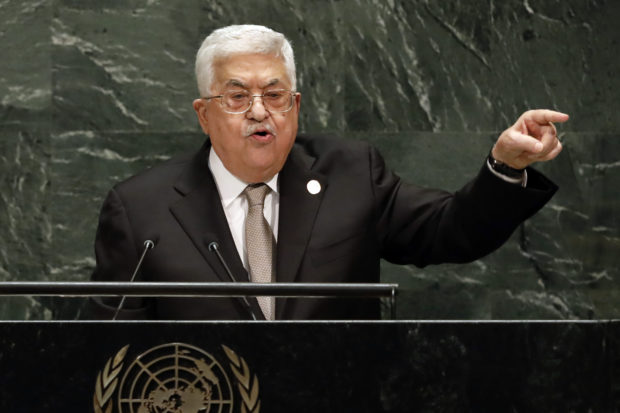Abbas slams US for ‘depriving peace process of credibility’
UNITED NATIONS – Palestinian President Mahmoud Abbas took to the world stage on Thursday to slam the United States for “depriving the peace process of any credibility” and undermining prospects for a two-state solution to the decades-old Israeli-Palestinian conflict.

Palestinian President Mahmoud Abbas addresses the 74th session of the United Nations General Assembly, Thursday, Sept. 26, 2019. (AP Photo/Richard Drew)
In a speech before the U.N. General Assembly, Abbas also criticized the U.S. for recognizing Jerusalem as Israel’s capital, for saying that Israeli settlements in the Palestinian territories are legitimate and cutting development aid to the Palestinians.
U.S. policy, he said, is “pushing large segments of the Palestinian people to lose hope in the possibility of long-awaited peace,” and renewed his call for an international peace conference.
The Trump administration has been working on a long-awaited peace plan, which the Palestinians have rejected over what they see as the administration’s unfair bias toward Israel. The last round of direct peace negotiations broke down in 2009, shortly after Prime Minister Benjamin Netanyahu assumed office. Israel’s foreign minister, Israel Katz, was scheduled to address the General Assembly later Thursday.
Abbas opened his speech with a warning:
“Our people are waiting for hope. Be careful, be careful, be careful,” Abbas said. “You should not ignore this generation and deprive them of this hope. I hope you do not deprive them of this hope.”
Article continues after this advertisementAbbas was not the only one seeking U.N. help to address conflicts with neighbors as leaders from nations struggling with war and poverty had their say before the world body.
Article continues after this advertisementThe president of Cyprus, Nicos Anastasiades, accused Turkey of undermining recent peace talks with its aggressive behavior. The two have been at odds since 1974, when Turkey invaded following a coup by supporters of union with Greece, splitting the country along ethnic lines.
Inequality within the United Nations also was a theme: Abbas urged the General Assembly to give the Palestinians, who in 2012 were granted the status of a U.N. observer state, full membership in the 193-nation world body.
Separately, Sierra Leone’s president, Julius Maada Bio, called for the Security Council to give Africa a permanent seat on the Security Council, which is the U.N.’s most powerful body.
It currently has 10 members elected for two-year terms and five permanent members — the United States, Russia, China, Britain and France.
“Africa’s patience has been tested,” he said, noting an urgent need for the continent’s representation.
For decades, there have been calls to expand the U.N.’s most powerful body, but competing national and regional interests have prevented council reform so far.
The most off-beat argument for reform came from El Salvador’s new leader, who opened his speech by taking a selfie and suggesting that the global gathering is out of touch with the times.
President Nayib Bukele said the U.N. needs to embrace change and technology to stay relevant — and suggested the assembly could meet via video and engage people around the world in its work.
Later Thursday, diplomats from Israel and Saudi Arabia, which blames Iran for a Sept. 14 attack on its key oil sites, were expected to push their causes.
Iran has denied any involvement in the Saudi strike, which jolted global oil prices and temporarily knocked out nearly 6% of daily global crude oil production.
Saudi Arabia insists Iranian weapons were used and has invited U.N. investigators to assess where the strikes originated. The U.S., France, Britain and Germany have said Iran was behind the attacks.
Iranian President Hassan Rouhani again denied any responsibility for the attacks in a news conference on Thursday.
Israel considers Iran to be its greatest enemy and has been a leading opponent to the 2015 international nuclear deal with Iran. Netanyahu, the Israeli prime minister, says Tehran is trying to build a nuclear weapon — which Iran denies — and has accused the Iranians of violating provisions of the agreement. /gsg